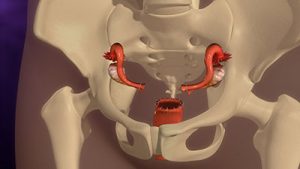How surgical removal of a woman’s uterus can affect her experience of menopause depends on whether one or both of her ovaries was removed at the same time. If both her ovaries were removed in a procedure called an oophorectomy, she will experience the symptoms of menopause as early as a day after her surgery. In some women, symptoms such as hot flashes, headaches, light-headedness, insomnia, night sweats and mood swings will be more intense than they normally would be if she entered menopause naturally.
However, if at least one of her ovaries are left after her uterus is removed, the patient may experience menopause at the normal stage of her life. The one difference is she will stop menstruating if her uterus is removed. However, her ovary or ovaries will continue to produce hormones.
In some women, the ovaries stop producing estrogen one or two years after the uterus is removed; this may be many years before they would enter menopause naturally. Most women at risk for ovarian failure had only one ovary removed at the same time as their uterus. Ovarian failure after the uterus is removed may or may not lead to the usual symptoms of menopause.
Why Would a Woman Have Her Uterus Removed Before Menopause?

• Endometriosis
This is where the lining of the uterus or endometrium breaks off and grows outside of the uterus. Though it’s no longer within the uterus, this tissue experiences the same hormonal changes that normal endometrial tissue experiences during the menstrual cycle.
• Uterine Fibroids That Don’t Respond to Other Treatments
These are non-cancerous tumors in or on the uterus. Women who have fibroids can opt for other treatments if the fibroids are troublesome, but these tumors often grow back.
• Reproductive Cancers
The uterus is removed in the cases of cancer of the uterus, cervix or ovaries. The uterus may also be removed if precancerous conditions are found in these organs.
• Adenomyosis
This is a condition where endometrial tissue infiltrates and grows inside the muscle wall of the uterus.
• Uterine Prolapse
This is when the uterus collapses into the patient’s vagina because the pelvic muscles no longer support it.
• Removal of the uterus
The removal of the uterus is also performed to stop pelvic pain or bleeding that doesn’t respond to other treatment.
Doctors claim that one reason for a woman not to have her ovaries removed is to avoid the symptoms of menopause. As discussed, removing the uterus and the ovaries brings immediate menopause with more intense symptoms. This is one reason why doctors recommend leaving the ovaries if they are still healthy. The ovaries produce estrogen even in women who are close to natural menopause. Estrogen has protective effects on health, and women who have had to have both their uteri and ovaries removed are sometimes given hormonal replacement therapy to make up for the lost hormone.





